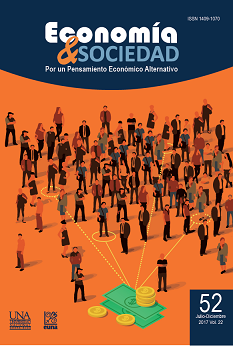Identification of factors affecting individual industries
DOI:
https://doi.org/10.15359/eys.22-52.4Keywords:
Single Industries, Knowledge-Based Industries, Industrial Policy, Ranking, TOPSIS.Abstract
High knowledge and technology are rapidly becoming a competitive advantage in today’s world. Individual industries are considered one of the key sectors in the country’s industry. Ranking the factors that affect these industries makes us more familiar with their effectiveness and helps us take actions to improve such factors in knowledge-based companies. Consequently, based on previous research studies on Individual Industries, field observations, and a questionnaire prepared by the researchers, the current study explores and classifies the factors affecting the establishment of these industries.
Regarding its purpose, this is an applied research, and regarding data collection, it is a descriptive survey. Using purposive sampling, 60 questionnaires were collected and effective factors were classified applying the SPSS software and the TOPSIS technique.
This study suggests that content factors are ranked first place, while contextual and structural factors are ranked second and third, respectively. Therefore, executives and managers in single industries are recommended to strengthen joint enterprise norms and dominant values and beliefs in knowledge-based companies in order to help the growth and development of single industries.
References
Battaglia, A. (2014). Creative industries and knowledge economy development in Rome: the example of Pietralata District. International Journal of Knowledge-Based Development, 5(3), 238-252. doi: https://doi.org/10.1504/ijkbd.2014.065316
Cabrita, M., Cruz-Machado, V., & Cabrita, C. (2013). Managing creative industries in the context of knowledge-based urban development. International Journal of Knowledge-Based Development, 4(4), 318-337. Doi: https://doi.org/10.1504/ijkbd.2013.058524
Chathoth, P. (2005). Strategic alliances in the high-tech industry. Logos-Verlag: Germany. https://doi.org/10.4324/9780080914343.ch10
Chang, H-J., Andreoni, A. & Kuan, M. (2013). International industrial policy experiences and the lessons for the UK (Working Paper No. 450). Retrieved from https://www.cbr.cam.ac.uk/fileadmin/user_upload/centre-for-business-research/downloads/working-papers/wp450.pdf
Chen, X. (2012). Varying Significance of Influencing Factors in Developing High-Tech Clusters: Using Cities of the U.S. and China as Example (Master's Thesis). Retrieved from web site of Columbia University: https://academiccommons.columbia.edu/.../Xia_Chen-HIGH-TECH_CLUSTERS.pdf
Cloodt, M., Hagedoorn, J., & Van Kranenburg, H. (2006). Mergers and acquisitions: Their effect on the innovative performance of companies in high-tech industries. Research policy, 35(5), 642-654. doi: https://doi.org/10.1016/j.respol.2006.02.007
Crandall, R., & Jackson, C. (2011). Antitrust in high-tech industries. Review of Industrial Organization, 38(4), 319-362. doi: https://doi.org/10.1007/s11151-011-9298-4
Deutch, J. (2005). What should the government do to encourage technical change in the energy sector? (Report No.120). Retrieved from web site of MIT Joint Program on the Science and Policy of Global Change: http://web.mit.edu/globalchange/www/MITJPSPGC_Rpt120.pdf
Dhéret, C., & Morosi, M. (2014). Towards a New Industrial Policy for Europe. European Policy Centre, (78). Retrieved from http://aei.pitt.edu/57931
Donate, M. J., & Guadamillas, F. (2011). Organizational factors to support knowledge management and innovation. Journal of Knowledge Management, 15(6), 890-914. doi: https://doi.org/10.1108/13673271111179271
Elia, G., Petti, C., & Sarcina, A. (2016). Promoting communities of innovation: Do industrial policies matter? International Journal of Knowledge-Based Development, 7(3), 207-224. doi: https://doi.org/10.1504/ijkbd.2016.078522
Federal Ministry of Education and Research. (2014). The new High-Tech Strategy Innovations for Germany, federal ministry of education and research. Retrieved from https://www.bmbf.de/pub/HTS_Broschuere_eng.pdf
Gambarotto, F., Bolisani, E., & Scarso, E. (2011). Mapping knowledge territories for development policies. International Journal of Knowledge-Based Development, 2(1), 16-33. doi: https://doi.org/10.1504/ijkbd.2011.040624
Gorji, E., & Alipourian, M. (2011). The Knowledge Economy and the Knowledge Assessment Methodology. Iranian Economic Review, 15(29), 43-72. Retrieved from https://ier.ut.ac.ir/article_32722.html
Hatakenaka, S. (2015). The role of higher education institutions in innovation and economic development. International Higher Education, 47. doi: https://doi.org/10.6017/ihe.2007.47.7961
Hawkins, B., Rudy, J. & Wallace, W. (2002). Technology Everywhere: A Campus Agenda for Educating and Managing Workers in the Digital Age (Vol. 6). Retrieved from https://www.educause.edu/ir/library/pdf/pub7006a.pdf
Heaidari, M. Moghimi, S. & Khanifar, H. (2011). The critical success factors in implementing knowledge management: agricultural organization in Islamic Republic of Iran, 1(2), 45-64. Retrieved from http://farabi.ut.ac.ir/elmi/teachers/Article_B_41.pdf
Khajeheian, D. (2016). Telecommunication Policy: Communication Act Update. Global Media Journal, 9(1), 135-141. Retrieved from http://www.gmj.uottawa.ca/1601/v9i1_khajeheian.pdf
Khajeheian, D., & Tadayoni, R. (2016). User innovation in public service broadcasts: creating public value by media entrepreneurship. International Journal of Technology Transfer and Commercialisation, 14(2), 117-131. doi: https://doi.org/10.1504/ijttc.2016.081635
Law, K. M. (2010). Factors affecting sustainability development: high-tech manufacturing firms in Taiwan. Asia Pacific Management Review, 15(4), 619-633. Retrieved from http://apmr.management.ncku.edu.tw/comm/updown/DW1012213796.pdf
Lee, K. C., Lee, S., & Kang, I. W. (2005). KMPI: measuring knowledge management performance. Information & Management, 42(3), 469-482. doi: https://doi.org/10.1016/j.im.2004.02.003
Lo, D., & Wu, M. (2014). The state and industrial policy in Chinese economic development. In: Salazar-Xirinachs, J. M. and Nübler, I. and Kozul-Wright, R., (eds.), Transforming Economies: Making industrial policy work for growth, jobs and development. Geneva: International Labour Office, 307-326. Retrieved from http://eprints.soas.ac.uk/20572
Matthew, D. Joro, I. D., & Manasseh, H. (2015). The Role of Information Communication Technology in Nigeria Educational System, International Journal of Research in Humanities and Social Studies, 2(2), 48-66. http://www.ijrhss.org/pdf/v2-i2/8.pdf
Poorzaman, J., Yusefi, E., Soleimani, M. & Hemmatyar, M. (2014). The Role of Critical Success Factors for Implementing Knowledge Management on Corporate Entrepreneurship, International Research Journal of Management Sciences, 2(3), 91-99. Retrieved from http://irjmsjournal.com/wp-content/uploads/paper351.pdf
Sadeghi, A., Azar, A., & Rad, R. S. (2012). Developing a fuzzy group AHP model for prioritizing the factors affecting success of high-Tech SME's in Iran: A Case Study. Procedia-Social and Behavioral Sciences, 62, 957-961. Retrieved from https://doi.org/10.1016/j.sbspro.2012.09.163
Salamzadeh, A., Kesim, H. K., & Salamzadeh, Y. (2016). Entrepreneurial universities and branding: A conceptual model proposal. World Review of Science, Technology and Sustainable Development, 12(4), 300-315. doi: https://doi.org/10.1504/wrstsd.2016.082188
Salamzadeh, Y. Ardakani, S. & Zanjirchi, M. (2009). What should we do now? Analysis of the globalization challenges in Iranian SMEs: a Study on Food Industries of Hamadan Province using Fuzzy MADM Approach. Annals of University of Bucharest, Economic and Administrative Series, 3, 165-178. http://annalseas.faa.ro/download/10%2520Yashar.pdf
Salamzadeh, Y., Nejati, M., & Salamzadeh, A. (2014). Agility path through work values in knowledge-based organizations: a study of virtual universities. Innovar, 24(53), 177-186. doi: https://doi.org/10.15446/innovar.v24n53.43942
Salamzadeh, Y., YousefNia, M. Radovic Markovic, M. & Salamzadeh, A. (2016). Strategic management development: the role of learning school on promotion of managers’ competence, Economía y Sociedad, 21(50), 1-25. doi: https://doi.org/10.15359/eys.21-50.4
Sepehrdoust, H., & Zamani Shabkhaneh, S. (2015). Impact of Knowledge-based Components on Total Factor Productivity of MENA Countries. Iranian Economic Review, 19(2), 149-163. Retrieved from https://ier.ut.ac.ir/article_56076_7434.html
Sharabi, M., Arian, O., & Simonovich, J. (2012). High-Tech and Public Sectors Employees' Perception of Factors Influencing Promotion. International Journal of Business and Social Science, 3(1), 116-130. Retrieved from http://citeweb.info/20122428425
Tan, F. B., & Leewongcharoen, K. (2005). Factors contributing to IT industry success in developing countries: The case of Thailand. Information Technology for Development, 11(2), 161-194. doi: https://doi.org/10.1002/itdj.20009
Wang, CH. & Chang Hu. L, (2014). Building exploration and exploitation in the high-tech industry: The role of relationship learning. Technological Forecasting and Social Change, 81, 331-340. doi: https://doi.org/10.1016/j.techfore.2013.04.008
Wolf, M. & Terrell, D. (2016). The high-tech industry, what is it and why it matters to our economic future? Retrieved from http://digitalcommons.ilr.cornell.edu/key_workplace/1566
Downloads
Published
How to Cite
Issue
Section
License
This publication is subject to the Creative Commons License; therefore, its attributions and restrictions must be respected.
Authors publishing in this Journal accept the following conditions:
- Authors retain copyright ownership and give the Journal first publication right of the paper, which is registered with the Creative Commons Attribution-NonCommercial-ShareAlike 4.0 International License. This license allows third parties to use the published work provided it is sourced as firstly published in this Journal.
- Authors may enter into other independent and additional contractual agreements for the non-exclusive distribution of the article published in this Journal (e.g., to be included in an institutional repository or published in a book) provided it is clearly stated that the work was published in this Journal for the first time.
- Authors are allowed and recommended to publish their work on the Internet (for example, on institutional or personal pages) before and during the review and publication process, as it can lead to productive exchanges and a greater and faster dissemination of work published.

The Economía & Sociedad Journal, published by Universidad Nacional, is licensed under a Creative Commons Reconocimiento-NoComercial-CompartirIgual 4.0 Internacional License. Based on http://www.revistas.una.ac.cr/index.php/economia.








